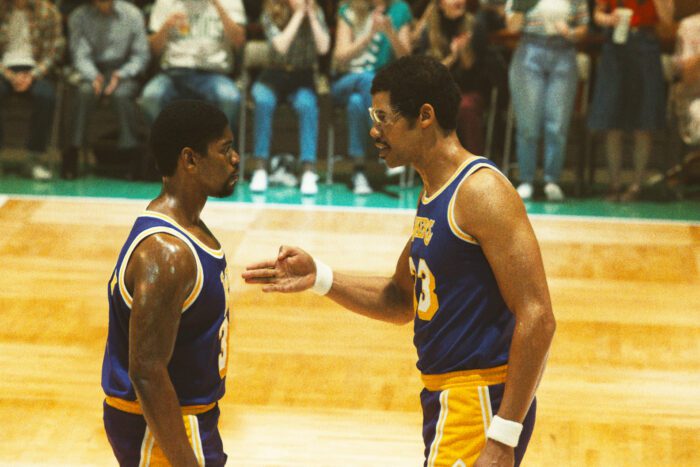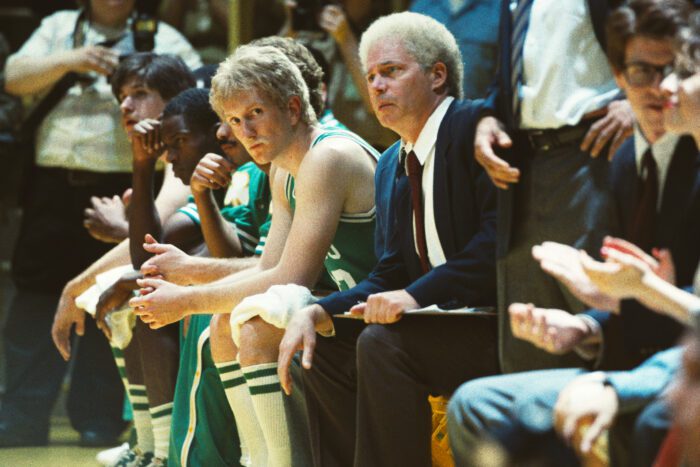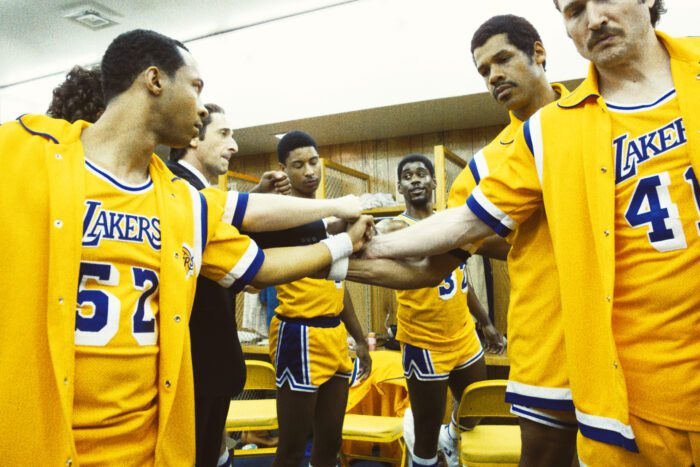The following recap contains spoilers for Winning Time S2E7, “What Is and What Should Never Be” (written by Max Borenstein & Rodney Barnes & Jim Hecht and directed by Salli Richardson-Whitfield)
Editor’s Note: This piece was written during the 2023 WGA and SAG-AFTRA strikes. Without the labor of the writers and actors currently on strike, the series being covered here wouldn’t exist.
We’re closing out Season 2 of Winning Time this week, and even though it’s only been seven episodes, there has been a tremendous amount of ground covered over the past few weeks, and it has been a great time following the Lakers. This week focuses on the 1984 finals between the Lakers and the Celtics, with the Lakers taking the first victory. The team couldn’t be happier as they escape from rioting Bostonians.
Even after two seasons of Winning Time, I continue to marvel at the attention to detail the show commits to. The opening HBO logo flying through space is, sure enough, the logo in use in ‘84, and I learned that the fanfare that plays during the modern HBO productions is almost the same tune as it was back then. And when the show plays “archival footage” it’s frankly so authentic looking that the only way to spot the recreation is to identify an actor.
Pat Riley (Adrien Brody) approaches Magic (Quincy Isaiah) on the bus to warn him once again about getting too cocky, after Magic predicts a sweep after just the first game. Magic replies that whatever Larry Bird (Sean Patrick Small) has coming, he’s ready for it. Pat is understandably concerned that Magic is making this a personal thing between him and Bird, and that could hurt the team, but Magic insists he has nothing to worry about.

Come the end of Game 2, the teams are tied with less than fifteen seconds on the clock, and the Lakers are stressing. Magic in particular rapidly tells his teammates to just pass him the ball so he can score, prompting Kareem (Solomon Hughes) to tell him to “breathe.” Once Magic has the ball, he freezes up. This scene did an excellent job at visually and aurally conveying anxiety. The seconds slowly counting down fill the entire frame, the camera speed ramps up and down, and Magic just looks lost before passing to Bob McAdoo with less than a second. The shot is not made, and the Lakers lose in overtime.
Jerry West (Jason Clarke) has a sit-down with Magic in his office, and he points out that Magic’s obsession with defeating Bird is coming at the expense of the rest of the team’s success. Magic repeatedly deflects, until West shares a rare, genuine anecdote about his own finals: while his teammates worked together, he was focused on just himself, and that was a mistake. That seems to be what finally breaks through to Magic.
What follows is a montage of Magic not only being more generous with the ball, but also practicing his passing game (setting a championship record for assists) and enthusiastically praising his teammates as they soundly defeat the Celtics in Game 3. It’s well known that Larry Bird is one of the most legendary trash talkers in the NBA, but this episode really emphasizes the pure venom flowing through his veins at the conclusion of third game, and it’s after that where things start to get really ugly between the teams.

In Game 4, Celtic Kevin McHale (Andrew Stephens) is knocked to the ground as the Lakers score, but gets nothing but insults from Bird for failing to block the shot. Just a short time later, McHale clotheslines Kurt Rambis (Joel Allen), Rambis attempts to retaliate, and all of a sudden it’s a brawl on the court. As a blur of green, purple and gold scuffle, Bird aggressively stops McHale from going to apologize to Rambis. Bird looks directly into the camera and says, “We got ‘em.”
And that they did: the Lakers are rattled and furious, and Bird knows it. With every play, he continues to egg on his rivals, playing dirty and causing the Lakers to play clumsily. Pat tries to get the team to keep their composure, but when the referee makes a clearly dubious call to foul out Kareem, it’s Magic holding Pat back from going at the ref.
Following their loss, Pat proceeds to tear apart the locker room office in a rage. I love a good meltdown, especially when glass things get thrown against the wall, which does happen here. Pat’s speech about them taking the bait was terrific, especially when he pointed out that it was an act of desperation: the Celtics can’t win playing clean, and if the Lakers keep their cool they will be victorious. This, sadly, does not hold true for Game 5, which gives the Celtics another win in the sweltering Boston stadium.
Jerry Buss (John C. Reilly) is not doing well. Still embroiled in that $100m lawsuit from Honey (Ari Graynor), Buss begs for reconciliation in his conference room, surrounded by their lawyers. But Honey holds firm, putting Buss on blast for taking advantage of her vulnerability and convincing her to abandon everything to become a part of his life, while he was still married to JoAnn. In a later conversation, Linda (Molly Gordon) asks Jeanie (Hadley Robinson) if she wants to go to the game, and the conversation almost immediately pivots to Buss, showing just how much of a hold he has on her. It is clear that Buss is unable to function without the women in his life, but is it him being a controlling fraud, as Honey says, or was he just never able to get out and truly be on his own without emotional support? I will say that Buss absolutely deserved the verbal mangling that an irate Claire (Gabby Hoffmann) delivered once she learned about the lawsuit.
But as Jeanie says, Buss is her dad, and she goes to his house to support him, silently going past the gaggle of reporters surrounding the mansion. It’s a really great scene: Buss and Jeanie stand at opposite ends of his entryway, and Buss painfully admits that his promises to Honey weren’t bullshit; he was just incapable of fulfilling them. Jeanie tells her father how much he means to her, and also delivers the hard truth that Buss interacts with his kids when it’s convenient for him. But at the same time, with Honey out of the picture, Jeanie has her dad back, and all she ever wanted was to work at his side with the Lakers. Later, she sits in her dad’s office, and talks to Claire about how she could probably run the Lakers (which she went on to do).

The run-up to the final game of the finals gives us one last, passionate speech from Coach Pat to his team: how this rivalry has been a thing since long before their time on the court, how they’ll feel when the game is done, and whether they gave it their all. In the 4th quarter, the Lakers are down by 14 points, and while Pat aggressively rallies the team during a timeout, Magic interrupts to point out that the Celtics are already celebrating. This galvanizes the Lakers to rapidly close the point gap, and the remainder of the game is thrilling, energetic, and tense. Even with the knowledge that this doesn’t end well for the Lakers, you can feel the excitement that they just might win it all. But that soon dissipates, and all that’s left is the realization that even with time left on the clock, victory is out of reach—and it hurts to see the Lakers in anguish as they fail to secure the championship.
The season concludes with Buss and Jeanie sharing a bottle of liquor in the middle of the empty stadium, optimistically proclaiming their ownership of the Lakers, followed by a series of title cards laying out what happened in the decades after that game, set to Pat Benatar’s “Shadows of the Night.”
There have been rumblings over the past few weeks regarding the show’s future, and this, sadly, seems to indicate that we might not be getting a third season, given that these cards essentially speed-run the remainder of the Lakers legacy through the ’80s. Whether the showrunners already know they’re getting cancelled, or this is just a contingency plan, this sequence is a hard pivot from the dour cliffhanger that left Magic sitting alone in the locker room shower, with so much more of the Showtime Era left to explore.
I really hope that we get just a little bit more of Winning Time. It would be a shame to end on such a downer note, and the epilogue feels blatantly tacked on. The journey over these two seasons has been an incredibly enjoyable one: the performances are universally fantastic, the editing and direction are beautiful, and the attention to detail in the production design is something that I don’t think gets enough attention. We should all cross our fingers to see the Lakers Dynasty continue on the screen, but if not, I am so happy to have experienced what we got.

